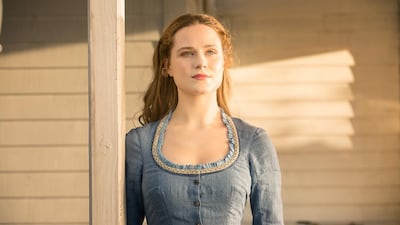At what point does the mistreatment or abuse of a machine become a morally questionable act?
The answer may seem obvious at first glance – a machine is an inanimate object, a thing, and if you have paid for it, it is surely yours to do with as you wish.
The line blurs horribly and disturbingly, however, when you add artificial intelligence to the equation and have the ability to create machines that look like us, are capable of having feelings like ours and that experience emotions in the same way we do.
This is the sinister premise of Westworld, the much-anticipated sci-fi drama from HBO, which debuts on Monday (October 3) on OSN First HD. This star-studded drama about the dawn, in the near future, of truly self-aware artificial intelligence and the nature of evil, is set in a futuristic theme park where synthetic humans, called "hosts", exist solely to fuel the fantasies of paying "guests" – from performing as gunslingers in a Wild West adventure, to acting out more debauched scenarios.
The 10-episode series, which is as complex as it is ambitious, explores the moral and ethical implications of creating and using “people” in this way.
The series is based on the 1973 movie of the same name, which starred Yul Brynner as a robot gunslinger. Written and directed by the late Michael Crichton at the dawn of the computer age, the film offered its own view of the potential conflict that might erupt between man and ever more powerful and intelligent machines, as the robots in a theme park malfunction and attack the guests.
Although a box-office hit in its time, and now considered a classic, reimagining Westworld for a modern audience required finding a way to shift the audience's sympathies to the robots. After all, thanks to a slew of Terminator movies, the idea of androids gunning for humans is hardly original anymore.
"[Executive producer] J J Abrams met with Michael Crichton two decades ago to ask: 'How do we remake this?,'" says Westworld co-creator Jonathan Nolan, best known for his co-writing work with director Christopher Nolan, his brother, including The Dark Knight and Interstellar.
“Years later, it occurs to J J, ‘It’s not a movie, it’s a series. And you make it about the hosts.’ So J J reached out to [co-creator] Lisa [Joy] and myself, and we got to play with all the questions we are most excited about today.”
In control of the AI population of the theme park is its brilliant creative director, Dr Robert Ford, played by Sir Anthony Hopkins (see our interview with him, right). Even at the age of 78, he has lost none of the cerebral, quietly ferocious intensity that earned him worldwide fame in a wide variety of roles, including his Oscar-winning turn as Hannibal "The Cannibal" Lecter in The Silence of the Lambs (1991) and its sequels.
Chief among his artificial minions is Dolores Abernathy, played by Evan Rachel Wood, who discovers that her entire "life" is an elaborately constructed lie – which brings to mind poignant echoes of The Truman Show, in which Jim Carrey's character, Truman Burbank, had to find meaning in his life after discovering he was the unwitting star of an elaborate reality-TV show.
"I did a lot of research and tried to learn about the actual technology, and now that's my hard drive," says Wood (The Wrestler, True Blood, Mildred Pierce).
“In the pilot, we worked a lot together on how far we were going to take it, and ultimately it was all about subtlety. It was acting Olympics – ‘Do we sweat? Will the sun blind us? Do we breathe?’”
British actress Thandie Newton, who won a Bafta for her role in the 2004 Oscar-winning film Crash, and plays Westworld's leading female host, echoes Woods's comments.
“I actually felt more human than I’ve ever felt, by nature of this simplicity,” she says.
Other key players in the ensemble cast include: Ed Harris (The Truman Show, Apollo 13) as the fearsome Gunslinger; James Marsden (X-Men) as Teddy Flood, a newly arrived gunslinger; and Jeffrey Wright (Boardwalk Empire) as Bernard Lowe, the creator and head programmer of the artificial people.
While other dramas might shock or scare us through the supernatural (American Horror Story), Westworld suggests that the scariest ghosts are resident in the machines of our own making, and in the ways they reflect our own uncertain morality.
In the end, the ethical and emotional repercussions of Westworld boil down to how each of us chooses to define "life".
“That’s very much what the show is examining: where does life begin?” says Nolan. “Whether or not it’s an artificial being, AI believe in their own realities and they feel as we feel our own feelings.”
• Westworld begins at 11pm on Monday, October 3 on OSN First HD
artslife@thenational.ae

